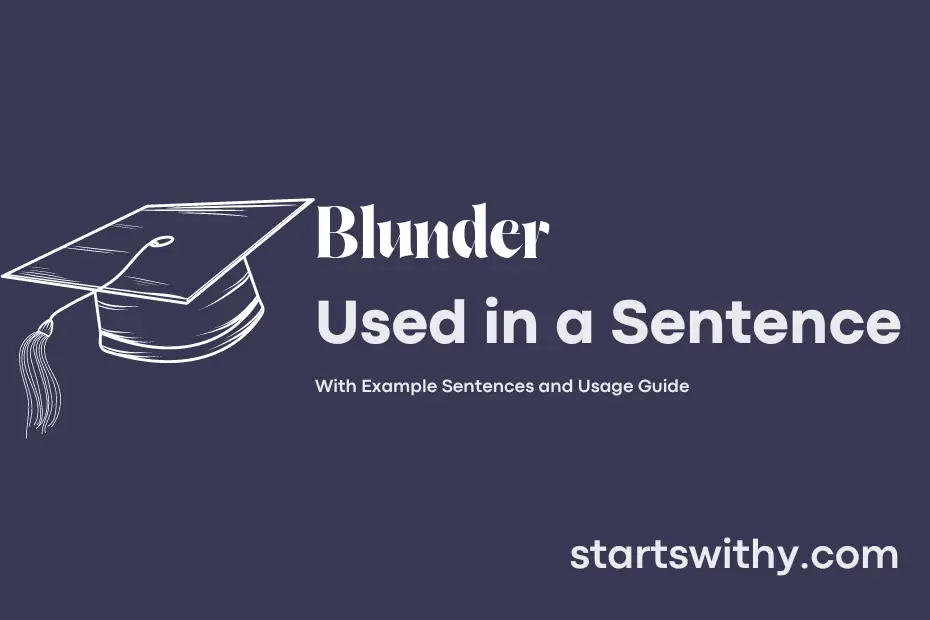Have you ever made a blunder while speaking or writing, resulting in an embarrassing mistake? A blunder is a careless, foolish, or embarrassing error that can happen to anyone, causing a moment of awkwardness or regret. Struggling with language use can lead to blunders that affect communication and understanding.
Avoiding blunders in our language usage is crucial, as they can alter meanings and hinder effective communication. By understanding common pitfalls and practicing proper language skills, we can prevent blunders and ensure clear and accurate expression.
7 Examples Of Blunder Used In a Sentence For Kids
- I made a blunder by spilling my milk all over the table.
- It was a blunder when I forgot my homework at home.
- She made a blunder by wearing her shoes on the wrong feet.
- It was a blunder when I colored outside the lines in my drawing.
- He made a blunder by knocking over his block tower.
- It was a blunder when I tripped and fell on the playground.
- She made a blunder by mixing up the names of her friends.
14 Sentences with Blunder Examples
- Forgetting to submit your assignment on time would be a major blunder.
- Making a blunder during a presentation can be embarrassing in front of your professors.
- Accidentally deleting important project files can turn into a huge blunder.
- Mixing up dates for exams can lead to a serious blunder.
- Not citing your sources properly in a research paper could be considered a blunder.
- Skipping crucial information in your notes can result in a blunder during exams.
- Misinterpreting instructions for a group project can cause a blunder in your teamwork.
- Failing to proofread your essay before submission can result in a blunder with grammatical errors.
- Losing your student ID card can lead to a blunder when trying to access campus facilities.
- Forgetting to set reminders for important deadlines can result in a blunder in time management.
- Underestimating the difficulty of a subject and not studying adequately can lead to a blunder during exams.
- Choosing the wrong elective course without proper research can turn into a blunder in academic planning.
- Ignoring feedback from professors on your assignments can result in a blunder in improving your academic skills.
- Not double-checking the accuracy of your citations in a research paper can lead to a blunder with plagiarism accusations.
How To Use Blunder in Sentences?
Blunder is a versatile word that can be used in various situations to describe a mistake or error made by someone. When incorporating blunder in a sentence, it is important to understand its meaning and context in order to convey the message effectively.
Here are some tips on how to use blunder in a sentence:
-
Subject + Verb + Blunder: Start your sentence with the subject performing an action, followed by a verb, and then introduce the blunder as the mistake made. For example, “She blundered by forgetting to save her work before closing the document.”
-
Blunder + Consequence: You can highlight the consequence of the mistake by using blunder in the beginning of the sentence. For instance, “The team’s blunder in not double-checking the calculations led to a costly error.”
-
Adjective + Blunder + Noun: Add an adjective before blunder to provide more context or emphasize the nature of the mistake. For example, “His careless blunder during the presentation left the entire audience confused.”
Remember to always use blunder in a sentence where a mistake or error is evident and make sure the context fits the situation. With practice, you will become more comfortable incorporating blunder into your writing.
Conclusion
In conclusion, blunders are mistakes or errors that can occur due to carelessness, lack of experience, or misjudgment. These blunders can have varying degrees of consequences, ranging from minor setbacks to significant failures. For instance, forgetting to save an important document before closing a computer program could be a simple blunder, while a miscalculation in a financial report could have more serious implications.
It is important to recognize and learn from blunders to prevent their occurrence in the future. By being attentive, thorough, and seeking help or advice when needed, individuals can minimize the likelihood of making costly mistakes. Taking the time to double-check work, clarify instructions, and remaining focused can all help in avoiding blunders and ensuring smoother outcomes in various aspects of life.



